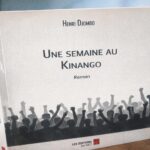Brazzaville acoustic evening
On 27 September, the banks of the Congo will trade their usual bustle for hush as singer-songwriter Aly Moulady turns a secluded Brazzaville venue into a temple of sound and taste. The evening, dubbed “Melodies & Delicacies”, promises an unplugged concert paired with a refined dinner.
Organisers describe the show as an “immersion for the five senses”, a deliberate attempt to reconnect urban audiences with acoustic music that breathes. Every chord, they say, will be heard as if whispered, every silence allowed to bloom into meaning before the next lyric lands.
The singer has chosen a total white dress code, inviting guests to become part of a living light installation beneath discreet stage bulbs. The visual purity is meant to echo the stripped-back arrangements, turning the room itself into a blank page on which melodies can write.
A gourmet duet of notes and flavours
After check-in, attendants will circulate trays of savoury bouchées and seasonal juices crafted by young Brazzaville chef Anita Loukoko. Her menu, kept secret until the night, has been designed in conversation with the set list so that spices rise and fade in harmony with tempo changes.
At the centre stands Moulady, 53, born Arsène in Dolisie, now dividing his time between Brazzaville and Paris. From the first album “Sérénade” in 1996 he has embraced rap, reggae and French chanson, a daring blend that earned him national revelation honours the next year.
Two decades on, he calls his style “Rumb’Urban”, a melt of rumba pulse, soul warmth, afrobeat drive and the storytelling clarity of chanson. He sings interchangeably in French and Lingala, keen to keep the river of Congolese lyrics flowing while opening bridges toward global listeners.
Honouring Congolese musical heritage
For the 27 September concert he has rehearsed a seventeen-song journey. Familiar favourites such as “Éphéméride”, “Bolingo na yo” and “Caroline” will surface in quieter, breathing versions led by nylon-string guitar, cajón and three-part backing vocals. The choice, he insists, allows stories hidden inside the grooves to reappear.
Mid-show, the lights will dim for a tribute segment honouring Congolese greats, among them Moulady’s late brother Fofana and rumba icon Papa Wemba. A single candle will be placed on stage as archived photos scroll across an overhead screen, inviting the audience to share a minute of quiet remembrance.
“It is important to play forward while looking back,” the artist told local station Radio Congo Culture earlier this month. “Our elders opened doors; our duty is to keep them from closing.” His words underline the concert’s double ambition: delight the present and preserve a collective sonic archive.
Logistics, tickets and local talent
Behind the scenes, 203 Production, the label Moulady directs, has mobilised a team of twenty technicians, many in their twenties, to run sound, lights and streaming. The goal is to present Congolese craftsmanship at every level, proving that high-spec live entertainment can bloom locally without relying solely on imported crews.
Tickets, priced at 25,000 FCFA, include the concert, the meal and a digital photo souvenir delivered by QR code. Organisers encourage early purchase, noting that capacity is capped at 200 to maintain the intimate, lounge-style atmosphere. As of this week, nearly half the seats have gone.
Public transport operators confirm that extra taxis will run along Avenue de France until midnight, while a monitored parking zone is being set up for private cars. Those living across the river in Kinshasa can book a return shuttle boat, scheduled to dock at 23:30 sharp.
Local lifestyle influencer Béatrice Mayemba, who attended rehearsal, praises the production’s visual ambition: “White on white gives the feeling of being inside a cloud. You forget the city outside.” Her short preview video already racks thousands of views, hinting at the social buzz the event may generate.
The road ahead for Rumb’Urban
Beyond one night, Moulady is finalising forty unreleased tracks, some recorded between Paris and Abidjan, others cut in a modest Brazzaville home studio. He hopes to release a double album next year, followed by a regional tour that would spotlight emerging Congolese acts as opening guests.
Cultural analyst Clément Oba sees strategic value in such collaborations. “It sends a signal that the Congolese scene is open and forward-looking,” he says. “When veterans share their stage, younger artists gain wings.” His comment mirrors government efforts to encourage creative industries as a driver of jobs.
While the concert is billed as intimate, streaming links will allow diaspora fans to watch live for 10 euros. Early tests show latency under two seconds, a technical step forward for local broadcasting. Footage will later be packaged into sixty-second capsules optimised for social platforms.
From candlelit tributes to careful soundchecks, every detail of “Melodies & Delicacies” points toward the same objective: make emotion audible. If the experiment succeeds, Brazzaville could see a new series of small-format concerts where food, fashion and finely balanced acoustics compose a passport to shared pride.





















